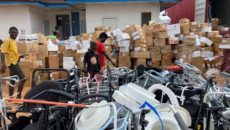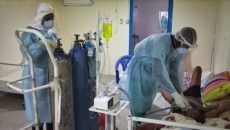MONROVIA, Montserrado – The National Public Health Institute of Liberia has acknowledged complaints about its employees being involved in extortion and fraud related to COVID-19 test results.
In a statement posted on its Facebook page, NPHIL suggested that its sample collectors were creating new codes and submitting different test samples for individuals who have tested positive for the virus.
“NPHIL takes these complaints extremely seriously and has commenced an internal review,” the public health agency said.
These complaints have been circulating in the public for months. They have created doubts among the public about the authenticity of information coming from the nation’s premier public health institute.
NPHIL emphasized that it would institute changes to clamp down on fraud, and “any staff caught in extortion and fraud will be dismissed and immediately turned over the appropriate authority for prosecution.”
The institute has also urged the public to remain calm and cooperate with health authorities, with the ultimate message that “contracting the virus is not a death sentence and, when identified early, could be treated by health professionals.”
This is not the first time NPHIL has moved to calm public fears and instill more confidence in the public health response. As more COVID-19 cases were being reported, Sen. Nyonblee Karnga-Lawrence of Grand Bassa posted on her Facebook page that Liberians should begin preparing their families for a lockdown in a day or two.
“Purchase foods that are not perishable such as rice, gari, green plantain, eddoes, sugar, milk, oil, sardines, luncheon meat, butter, cornmeal, and oats,” the senator warned.
She told Liberians to stay home and protect themselves.
Speaking to The Bush Chicken via phone after the senator made the post, Daniel Sando, the administrative assistant in her office, said the message was sent out because the senator noticed that deaths were increasing across the country due to the third wave of the pandemic.
During the first wave, Sando said the government had locked down the country to prevent the pandemic from spreading. The call for a lockdown now by Sen. Karnga-Lawrence was only meant to protect lives, he said.
“It is important to lock down the county for a short period, and the government ensures that rapid testing is done in the various communities to reduce the spread of the virus,” he added.
“So, in the senator’s mind, it is a prudent thing to partially lockdown the country to minimize the forward spread of the deadly virus and protect lives.”
However, NPHIL reacted almost immediately, anticipating widespread panic in response to a pending lockdown that could have had counterintuitive results. On June 27, it urged the public to remain calm because “health authorities in the country have not reached any decision on imposing a lockdown.”
When that decision is reached, NPHIL said it would be communicated to the public.
Karnga-Lawrence’s statement itself drew ridicule from the public, as many pointed out the tone-deafness of the warning since few Liberians have the means to stockpile food to last more than a few days.
Featured photo by Zeze Ballah



